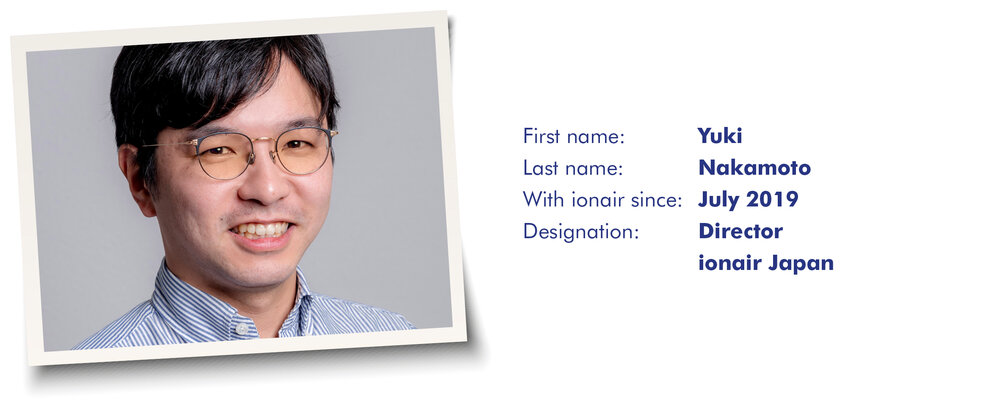PROFILE OF Yuki Nakamoto

Yuki Nakamoto – You have been the Deputy Director at ionair Japan Co. Ltd. since July 2019. How have you been accepted by the ionair community?
The reception has been very cordial and everyone within the large ionair family has made me feel really welcome. This in turn made my induction very straightforward. In this way, I have already learned a great deal about the ionization market and the technology. This is a technology that is complex for many, despite it having been discovered over 100 years ago. Nevertheless, this is changing now, since awareness regarding clean indoor air and, in general, even outdoor air is growing. This is not least thanks to the ongoing discussions on climate change and it is no different in Japan. In this regard, years ago in Japan it was not at all normal to consume expensive mineral or bottled water instead of the proven and low-cost tap water. However, opinions have changed considerably in recent years. Today, Japanese people drink mineral or bottled water. In my opinion, this is what will also happen with indoor air. And this is why Ionair has a great future in Japan.
You spent two weeks on an orientation with ionair Group in Lucerne in Switzerland. Could you elaborate on your initial impressions?
For me, they were very intensive weeks that offered up several new impressions. During this period, I was able to pick up and understand a large part of the corporate philosophy. This was a decisive aspect for me, simply because it is important for me to ensure the thinking of the head office also became part of my own thinking. I have been really impressed by Switzerland. Now I understand why so many people throughout the world envy Switzerland. I was really impressed by the diversity of the landscape, especially that of the Alps, which until then I only knew about from the «Heidi films». The air is particularly fresh and clean in the Alps. In fact, it is perfectly in line with the Ionair claim: «Naturally Fresh Air». Incidentally, Heidi is extremely popular in Japan. Switzerland – Heidi – ionair: A successful trio for the Japanese market.
You have worked in Europe before, including, among other countries, in Austria. You are well aware of the European market. What are the significant differences compared to the Japanese market?
The markets obviously differ in terms of several minor details. Ultimately, I differentiate between the Japanese and the European markets with respect to three parameters. One concerns the business relationship. Even if the customer is King in European countries, the exchange between providers and the customers takes place on a level playing field. In Japan, that is entirely different. Here in Japan, the «Customer is God». Starting from there, everything is directed from the top downwards, and the sellers have to follow the desire of the customer as far as possible.
Secondly, it is a matter of imported products and the information about them. They are kept rather brief compared to information about Japanese products, which are generally speaking more comprehensive in the original language. In fact, even on the Internet, the majority of the population search for Japanese and not for English keywords or expressions.
As per the last point, I would like to say that the Japanese market is inclined to give preference to Japanese products. This thought process probably works in a similar way to the «Swiss made» label. If the customer in Japan purchases a product, the product information is customized to him/her. This service is generally unique. In order to compensate for this, it is important that you are in a position to be able to differentiate correctly and to understand the circumstances and backgrounds of the customers. If not, the customers will not be interested in our offer, regardless of how attractive it might be.
How important is the Japanese market for the Ionair Group?
I often speak with our CEO, Beda Weibel, on this matter. He has felt for several years that the Japanese market is very important for Ionair. Keeping the size and the strength of the Japanese economy in mind, I think that our results and success will soon be visible, assuming, of course, that we are able to customize the Ionair product to the Japanese requirements.
With the «Air Quality System» (AQS) in the ventilation system, the air quality and hygiene in the ventilated room improve significantly. How relevant is the subject of indoor air and hygiene in Japan?
In Japan, there is a standard guideline for the air quality in indoor rooms. However, it is only defined in relation to the CO2 level. Nevertheless, in the future, it will be necessary to establish a new standard, not only for CO2, but also for some other pathogenic substances. We are preparing ourselves in this regard in order to ascertain what Ionair can offer.
You took over as CEO in mid-February. What are your priorities at the moment?
I have three priorities for the Japanese market that I will focus on: First of all, I would like to further develop the perception of Ionair in the market. Secondly, I will work on the organizational aspect so that Ionair can grow in the local market. And thirdly, I would like to set up a sustainable business model with Ionair. For me, these are the most important prerequisites for realizing the success story of Ionair in Japan.
What would you like to achieve with ionair Japan Co., Ltd.?
We would like to establish Ionair in the Japanese market in the medium term. I am aligning the strategy towards that goal. Over and above this, I would like to grow with the company, and to make the Ionair concept of «Naturally fresh air» so appealing to the Japanese that they instinctively want to install our product in their ventilation systems.



















